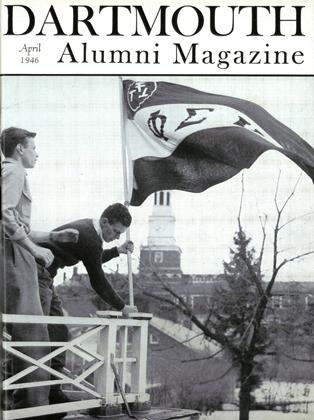THE SPRING TERM of Dartmouth's 177th academic year was formally opened on the morning of March 11 with a brief convocation in crowded Webster Hall. President Dickey, welcoming back the hundreds of veterans who were resuming their Dartmouth studies after war service, promised that the College would be quick to recognize any social maturity demonstrated by the students and emphasized that the business of all in being in Hanover was learning.
The following is an abstract rather than a verbatim report of President Dickey's short address to the faculty and student audience:
My words this morning are simply of welcome—of welcome to you who are returned to make Dartmouth Dartmouth again.
This term marks the end of the wartime academic program at Dartmouth. The summer session will be directed largely to the unfinished business of the war program. We are gathered together again for the purposes of peace.
A college community by its very nature witnesses many comings and goings. Over the years they are mainly joyful and lighthearted, but there have been periods such as these last four years when this has not been true. Upwards of 300 of the men of Dartmouth who went out are not coming back now or ever. And yet they are still with us although not here. As the years go by you will grow into full understanding of the truth"The Mother keeps them in her heart And guards their altar flame; The still North remembers them, The hill-winds know their name."
Both for you who are returning to Dartmouth and you who are here for the first time, may I remind you that you are taking up three different, although closely intertwined, responsibilities: One, you are citizens of a community; two, you are the organic stuff of an institution; and three, your business here is learning.
With regard to citizenship in the com- munity, which is Hanover, remember that you are never alone as a member of any community. You men who are back from the war will undoubtedly demonstrate greater individual maturity, and as greater social maturity is shown the College will not be slow to recognize it. We now have a joint student-faculty committee surveying the rules of the College in the light of new conditions, and it is our hope that you will demonstrate that sense of community responsibility which will lead this committee to recommend and the College to adopt rules of conduct and a system of government based upon a high degree of social maturity.
You are the organic stuff of an institution, which is Dartmouth. Any institution is a product of three things: the past, what its men have been; the present, what its men are; and the future, what its men want to be. The continuance of Dartmouth traditions and the fashioning of Dartmouth's purpose are more completely in your hands than almost any previous group. Traditions can be passed on only from men to men and not alone by the written word. You Dartmouth men who are back have the opportunity and the responsibility to keep alive Dartmouth's traditions, to pass them on, and in doing so to decide which are worthy of being passed on.
And finally let me remind you again that your business here is learning. All else is subsidiary; this is the "why" you are here. Behind you are literally thousands of men who want to be here but cannot because you are here. You will find the pace stiffer, the purpose clearer. The College recognizes the "right" of no man to be here, but after much effort and concern it has bet on each of you as being worthy to be here—that is, worthy of the business of learning. We know you can if you will. That is something, gentlemen, which is between you and yourself every single day of the days ahead. We will be with you—and good luck.
 View Full Issue
View Full Issue
More From This Issue
-
 Class Notes
Class Notes1918
April 1946 By ERNEST H. EARLEY, DONALD L. BARR -
 Article
ArticleLabor Marches With the Times
April 1946 By MALCOLM KEIR, -
 Article
ArticleTHE NEW CURRICULUM
April 1946 By PROF. HUGH S. MORRISON '26, -
 Class Notes
Class Notes1917
April 1946 By MOTT D. BROWN, DONALD BROOKS -
 Class Notes
Class Notes1911
April 1946 By NATHANIEL G. BURLEIGH, EDWIN R. KEELER -
 Article
ArticleEducational Aims
April 1946 By PROF. CHARLES LEONARD STONE '17








